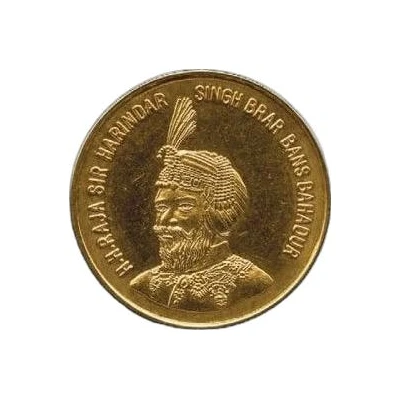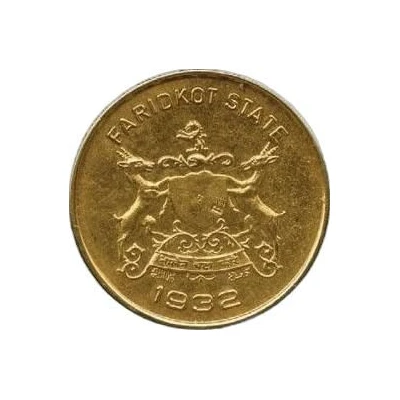


⅔ Mohur - Harindar Singh Brar Medallic Gold Issue
1932 year| Gold | 8.07 g | - |
| Issuer | Princely state of Faridkot (Indian princely states) |
|---|---|
| Maharaja | Harindar Singh Brar (1918-1947) |
| Type | Non-circulating coin |
| Year | 1932 |
| Value | ⅔ Mohur (10) |
| Currency | Rupee |
| Composition | Gold |
| Weight | 8.07 g |
| Shape | Round |
| Technique | Milled |
| Orientation | Medal alignment ↑↑ |
| Demonetized | Yes |
| Updated | 2024-10-05 |
| Numista | N#425098 |
|---|---|
| Rarity index | 100% |
Reverse
Coat of Arms of Faridkot with State above and date below
Scripts: Devanagari, Latin
Lettering:
FARIDKOT
Bhalan chira phari
1932
Translation: Azure and argent
Edge
Plain
Comment
Medallic (Non circulating) issue, this ⅔ Mohur (equal to 10 Rupees) is one of three recorded Gold issues by Faridkot in the waning days of its existence under their last king. This coin, though tender, was more likely a bullion issue (especially in the depression era) and a presentation piece. While the fineness is unknown, it is likely 22Karat (917 fine) in line with the weight basis of the coin being similar to other issues, and most princely states either using 22 Karat or 24 Karat gold for such issues. Another 10 Rupee coin - with an associated gold 5 Rupee coin - was issued in 1941 with a different portrait. Faridkot is located in present day Punjab, India and was ruled by a Sikh dynasty from the 1800s. It was a 11 Gun salute state. 
Coat of Arms on Faridkot, as shown on the coin (Credit: https://www.royalark.net/India/faridkot.htm )
Interesting fact
One interesting fact about the ⅔ Mohur - Harindar Singh Brar (Medallic Gold Issue) 1932 coin from the Princely state of Faridkot is that it features a unique blend of Indian and Western design elements. The obverse side of the coin bears the image of a crowned bust of King George V, while the reverse side features a depiction of the Hindu goddess Lakshmi, highlighting the cultural fusion that was characteristic of the Indian princely states during the British colonial era.